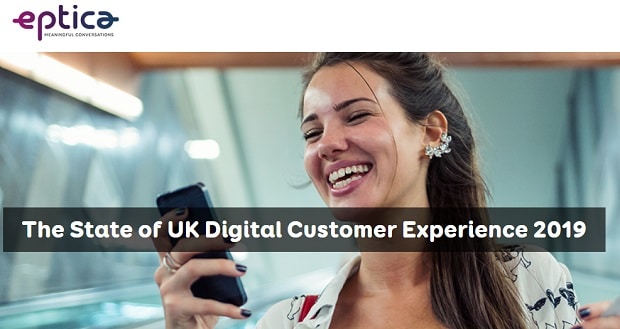
The 2019 Eptica Digital Trust Study indicates that fashion and food & drink retailers were the top sectors, successfully answering 60% of all queries. Insurance brought up the rear with just 46%.
Key findings were:
- Overall brands answered 69% of questions on the web, email and social media, up from 59% in 2017
- This masked big gaps in performance. For example, while brands answered 75% of queries online, they only successfully responded to 37% of emails, down from 2017
- Facebook, not Twitter is the best social media channel for customer service, answering 57% of queries. Both Facebook and Twitter were 10x faster than email – when answering exactly the same query
- 58% of brands failed to provide consistent answers across any channels
- Trust is key to long term customer relationships. 89% of consumers said they’d either switch or spend less with brands they didn’t trust
- Trust starts with good customer service, not advertising. 59% ranked giving satisfactory, fast answers as a top 3 factor in creating trust. Just 16% ranked good advertising in the top 3.
While brands answered 69% of all routine queries via the web, email, Facebook and Twitter, this masked wide gaps between different brands, sectors and channels. For example, a bank took 8 days to respond to an email. One fashion retailer answered a tweet about ethical sourcing policies in 17 minutes, yet another took 50 hours.
Trust is increasingly central to customer relationships. 89% of consumers surveyed said they either will stop buying from brands that they don’t trust or will spend less. Around half (49%) said they would switch immediately. Building trust begins with delivering on basic promises – 59% ranked giving satisfactory, consistent answers as a top three factor in creating trustworthiness, while 63% rated making processes easy and seamless as key.
The web was the most accurate and comprehensive channel for customer experience, with brands answering an average of 75% of routine queries. It was followed by Facebook, where brands successfully responded to 57% of questions (nearly doubling from 30% in 2017). This was significantly ahead of Twitter (45%), despite the channel’s reputation for delivering customer service.
Email brought up the rear. 37% of brands satisfactorily answered a basic question, with average speed ten times slower than social media. Chat continued to grow in importance, with 44% of brands claiming to offer it – yet just 26% had it operational when tested, a slight improvement on 2017’s 24%.
The Eptica Digital Trust Study builds on research first conducted in 2012 by customer experience software provider Eptica. It combined real-world evaluations of 50 brands in five sectors with consumer research on attitudes to customer experience and trust. Evaluation questions included asking about multi-policy discounts (insurance), ethical sourcing policies (fashion), changing a booking (travel), cancelling debit cards (banking) and allergy labelling (food and drink).
“Brands face multiple challenges when it comes to customer experience,” said Olivier Njamfa, CEO and Co-Founder, Eptica. “Consumer expectations are continually rising, while the volume and complexity of queries and interactions are growing. Trust is crucial to engagement and loyalty, but the 2019 Eptica Digital Trust Study shows that many brands are falling at the first hurdle, with their inability to get the basics right undermining reputation and revenues.”
| Accuracy 2019 versus 2017 | Speed 2019 versus 2017 | |
| Web | 75% vs 66% | n/a |
| 37% vs 43% | 37 hours 59 minutes vs 46 hours 42 minutes | |
| 57% vs 30% | 3 hours 24 minutes vs 2 hours 21 minutes | |
| 45% vs 39% | 4 hours 53 minutes vs 57 minutes 19 seconds in 2017 | |
| Chat | 90% vs 87% | 6 minutes 14s vs 4m 40 |
| Total | 69% vs 59% |
While brands answered 69% of queries overall, nearly a third either did not receive a response – or that replies failed to answer the question. This backs up consumer beliefs that brands are ignoring them – just 8% of respondents said that brands were listening all the time, missing out on the insight needed to drive improvements and strengthen trust.
Inconsistency and gaps growing
The Study found growing gaps between best and worst performers, between channels and within sectors:
- Fashion retailers successfully answered 60% of questions across all channels, while insurers only managed under half (46%)
- In the travel sector, three brands scored 100% on the web – yet two rivals only answered 40% of questions.
- None of the banks surveyed successfully responded to an emailed question – yet 80% of them answered it on Twitter, and 45% on Facebook.
At a time of greater pressure on resources, brands need to take a more holistic view across channels to drive a consistent, efficient customer experience that builds trust.
As well as accuracy, the Eptica Digital Trust Study also measured consistency between channels. Well over half (58%) of companies were completely inconsistent with no answers matching on more than one channel. Consistency varied wildly within sectors – for example, one travel company said on Twitter that it was free to amend a booking, but responded on Facebook saying it would cost £35 per person to do so.
The study evaluated 50 UK brands, split equally between the fashion, food and drink, travel, insurance and banking sectors. Brands were rated on their ability to answer five routine questions via their websites, as well as their speed, accuracy and consistency when responding to email, Twitter, Facebook and chat. Additionally, 1,000 UK consumers were surveyed on their attitude to trust, its relationship with customer experience and on loyalty and brand reputation. All research was completed in Q1 2019.
A full report, including the study results, graphics and best practice recommendations for brands to transform customer experience is available at https://www.eptica.com/dtcxst.
An infographic on the results is available at https://www.eptica.com/resources/white-papers.
